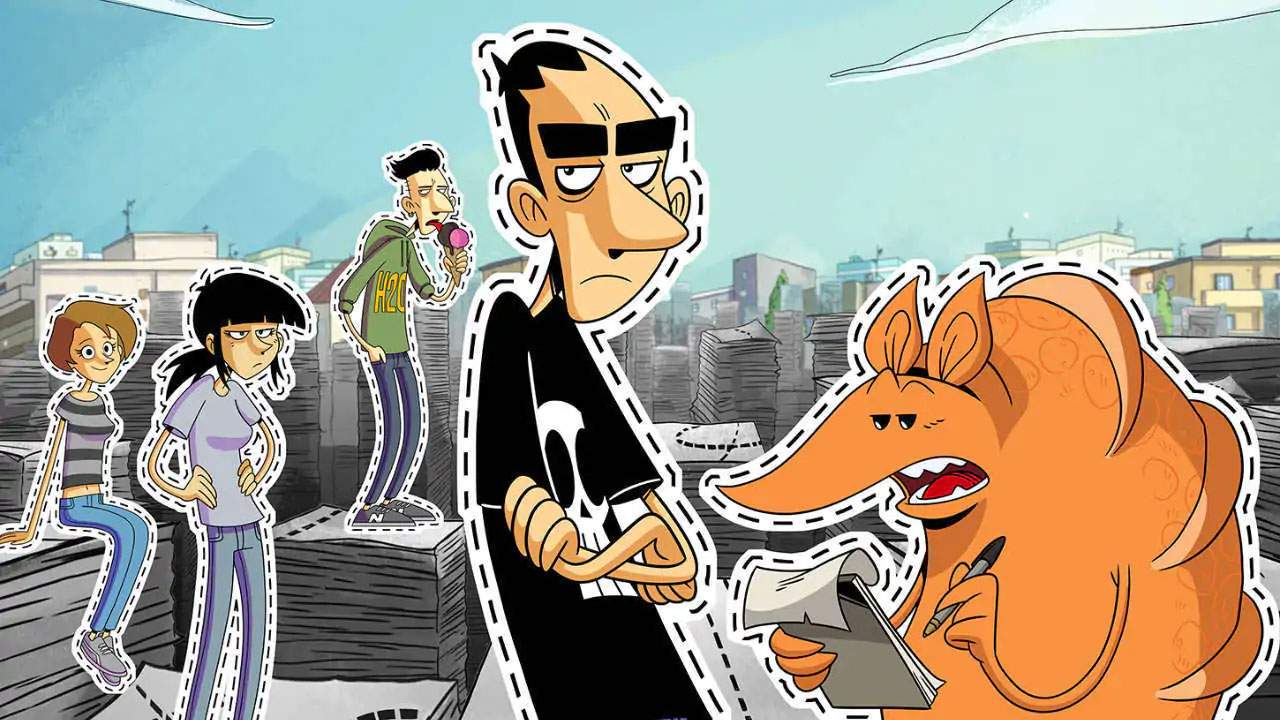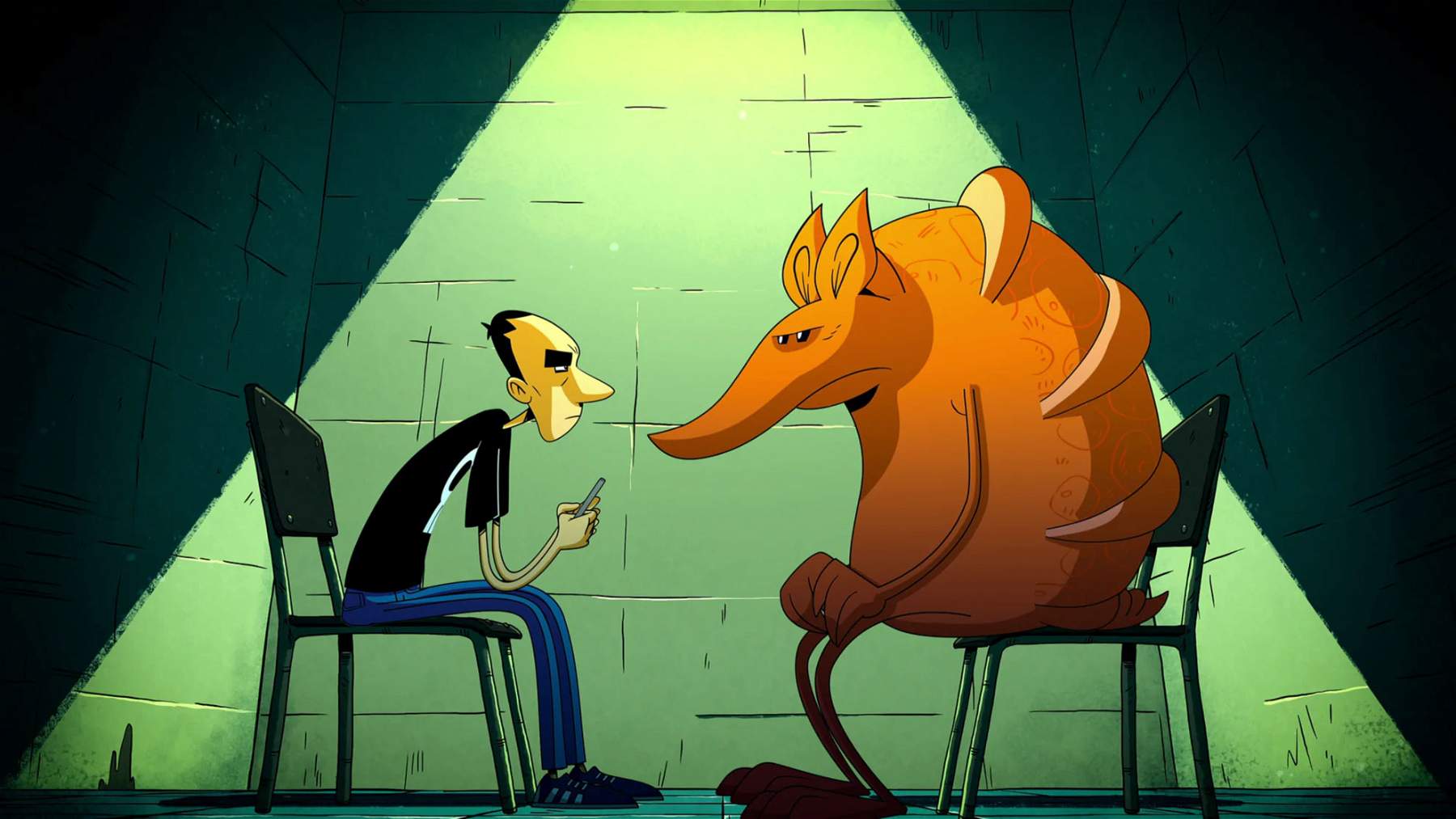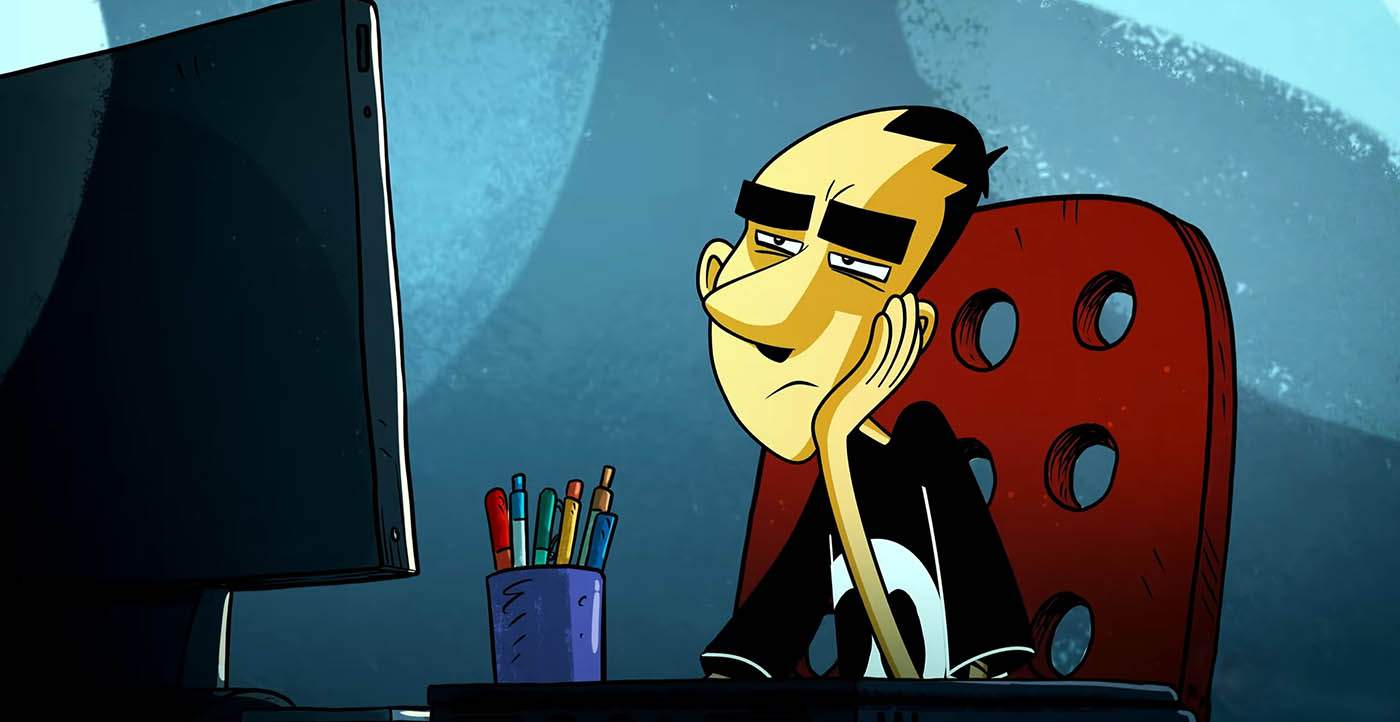Rome, overview of the city (or rather the neighborhood of Rebibbia, which in Zerocalcare ’s world equals the universe). Fleeting shots of metropolitan chaos, streets teeming with humans, machines, technology, all tangled together. Electronic music. The annoying buzz of a mosquito dodging urban obstacles until it smashes to death against a bus windshield. A graffiti on the wall, “It’s no use living outside if you die inside.” So opens the first installment of Zerocalcare’s new series Tear Along the Edges produced by Netflix and already a cult hit, topping the streaming platform’s charts and on everyone’s lips just a week after its official release.
Those who do not know Zerocalcare, stage name of Aretine cartoonist Michele Rech, might not appreciate certain pop stuff, certain lashings of generational humor, certain passionate and somewhat foul-mouthed Romanaccio. On the other hand, those who have followed in his footsteps find the familiarity of those values that have always characterized his poetics: the biting self-mockery, the spontaneous and pressing dialect, the autobiographical theme, the evocation of the past, the wacky wisdom of his closest friends, the talking animals that inhabit his familial and collective dimension, and the unfailing self-destructive cynicism of his traditional alter ego: the Armadillo.
Tearing along the edges in fact takes up the maxi-story that Zerocalcare has been carrying on since The Prophecy of the Armadillo, his debut work published in 2011 with the support of Marco D’Ambrosio (aka Makkox). A symbolic animal, here magnificently voiced by Valerio Mastandrea, thearmadillo represents Zero’s conscience, which rather than flanking him as a moral guide on the path to self-awareness (as a talking cricket would?) projects waves of doubts and insecurities on him, reflecting his tendency to close in his shell in the face of any difficulty. And she gives him bad advice: for example, make up his resume with fanciful ventures to get a job, because “the weakness of capitalism is that it is mouthy, it wastes too much time if it has to check us all. It’s vulnerable to dicks.”
Another major driving force in Zerocalcare’s poetics is (self-)irony, the foundation of a sincere and universal language that manages to range from adolescent drama to love, from more serious topics (sexism, xenophobia, political current affairs, job insecurity, etc.) to the theme of death, not without the pleasure of occasionally planting some healthy and sacrosanct swear words.
In the six episodes of the first season, the artist narrates himself as he makes two simultaneous journeys. One journey is temporal, within his past, recalling memories and key moments from his childhood and adolescence. And one journey is spatial, taking shape in the carriage of a train that leads the protagonist and his faithful friends from Roma Termini to a certain destination. A destination not only physical, but also and above all mental.





The concept that guides the entire series, starting right from the title and opening theme song, isa gesture: tearing a sheet of paper following a dotted line. A delicate but seemingly easy job, almost a child’s game. After all, by definition, the cut line exists to facilitate the division of a surface into two parts intended to be separated according to standards. Nothing could be more obvious. In Zerocalcare’s philosophy, however, the sheet takes on a new, symbolic, even threatening meaning for those who find themselves facing the turbulence of puberty: the tearing will turn out to be a metaphor for an existence lived softly, under the banner of procrastination and of choices confined to one’s comfort zone, such as ordering the usual margherita pizza every time. Then one day the dotted line, which as long as one was a kid appeared as an obligatory and reassuring route to a serene destiny, suddenly becomes a ridge on which to advance poised between the sense of inadequacy, the need to find a place in society and in the world, and the anguish of falling into the abysses of one’s own fragility. Which in Zerocalcare’s code is equivalent to a clumsy tearing of the sheet into amorphous shreds: pieces of one’s identity that have shattered irreversibly. A frightening epilogue.
“Back then we went slow because we thought that’s how life worked, that all we had to do was tear along the edges slowly, follow the dotted line of what we were destined for and everything would take the shape it was meant to have. Because we were seventeen and had all the time in the world.”
Zero epitomizes the typical Millennial or Generation Z teenager, born between 1981 and the late 2000s, trying to muddle through the emotional imbalances of puberty and the restlessness of living in a historical era in which he does not recognize himself. School disappointments, unrequited love, the feeling of not being able to escape from routine, emotional instability. A hyper-technologized society that drives alienation and social isolation, a precarious and underpaid job market. The depletion of time, the past that no longer returns, the fear of the future, of the unknown, of dying. But then what is the solution, to stand still? Keep that piece of paper like a relic, hoping for the indulgence of time? Avoid any deviation on the marked path? Give up on living? Of course, it is not that easy, and little by little the protagonist Zero gets there, too: when he realizes that time has a consuming effect on everything real and concrete that exists, and when he later realizes that by dint of taking the easy road, the only possible destination is death itself.
Millennials and Generation Z are the social subject matter told by Michele Rech and they are the audience he has always addressed, because he himself belongs to it and shares its experiences and moods. That is why his comic strips are an honest, truthful, acute (even in the most trivial moments of irony) snapshot of the malaise of entire generations. With the great virtue of never falling back on the pretense of offering absolute answers. Because what is absolute is only the awareness of being part of a collective feeling, which the noble art of drawing has the power to reshape and transform into beneficial energy. Therein lies all the beauty of Zerocalcare: knowing how to speak to anyone with simplicity and lightness about universal problems, perhaps even managing to open a channel of solidarity communication to those who, like the character of Alice, had come to think they could no longer cope.
Among the various roles in the series, Sarah and Secco both play a key role: best friends of the protagonist, characterized by two self-aware but diametrically opposed approaches to life, they constitute his points of reference. One falls in love with the figure of Sarah: as well as an antidote to Zero’s crises of conscience (which he exorcises in imaginary and surreal conversations with the Armadillo), Sarah is also imbued with a serene wisdom that has offered comfort to her friend since the days of his early school misadventures. In the last episode, the two friends both undergo a transformation: on the one hand, the epiphany of Zero who, at the end of the journey, in a few moments puts his certainties and his entire life into perspective (and into question); on the other hand, the voice of Sarah, whose change coincides with the boy’s maturation process. Dubbed by Zerocalcare himself, with effects between the comic and the grotesque, in the end her identity is restored to more suave, melodious mulieval vocal chords, limpid messengers of a truth that Zero finally manages to understand, despite having had it there before his eyes all along. “But don’t you realize how beautiful it is? That you don’t carry the weight of the world on your shoulders, you’re just a blade of grass in a meadow? Don’t you feel lighter?”/ “We are blades of grass, remember?” A meadow, a free zone where there is no room for shells and monstrous architectures of the psyche, but only for good advice from real talking crickets.
Warning: the translation into English of the original Italian article was created using automatic tools. We undertake to review all articles, but we do not guarantee the total absence of inaccuracies in the translation due to the program. You can find the original by clicking on the ITA button. If you find any mistake,please contact us.